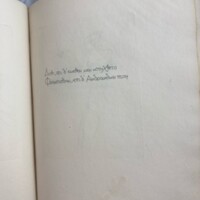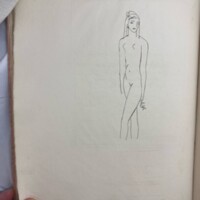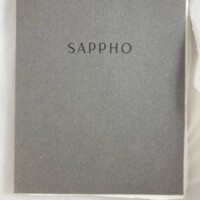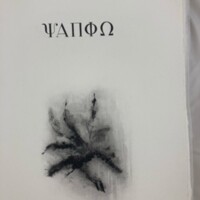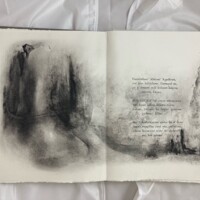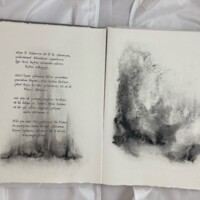Leaders and Heroes 2: The Arts
Sappho of Lesbos (ca. 610-570 BCE)
Sappho or Psappho was a poet from the island of Lesbos, just off the coast of modern-day Turkey. We know very little about her life, but it seems plausible that she was the leader of either a young women’s chorus or of a female religious community dedicated to Aphrodite, the Greek goddess of love and pleasure. She spoke a dialect of Aeolic Greek and is the earliest Greek woman of whom a substantial amount of poetry has survived, though not much of it has: out of an estimated 10,000 lines of poetry attributed to her, only 650 lines have survived. Her poetry survives in one complete song, ten substantial fragments, fifty scraps of papyrus, and a hundred short quotations of poetry in the writings of ancient authors. She wrote a variety of genres — cultic hymns, wedding songs, satirical songs, epigrams, elegiacs, and iambics — and on a variety of topics, ranging from erotic desire to old age. She is famous for her thematization of female homosexual love, to the point where the words “lesbian” and “Sapphic” have been used since the eighteenth century to describe homosexual woman.
Special Collections has a number of books related to Sappho, but for this exhibition, we have confined ourselves to two. For both, we include the pages that present Sappho’s only poem that survived in its entirety, the Ode to Aphrodite. A translation of the poem by J.V. Cunningham is included at the end of this page; Special Collections has a copy of this translation as printed by the fine press Palaemon Press.
First, we have a collection of twenty-two poetic fragments in Greek, prepared by Emil Rudolf Weiß (1875-1942) and Renée Sintenis (1888-1965). Weiß and Sintenis were important artists during the Weimar Republic and were eventually driven from public life by the Nazis, as was their editor for this book, Julius Meier-Graefe. Weiß designed the typeface for the book and Sintenis did the illustrations. Both text and images are characterized by the fineness of the linework.
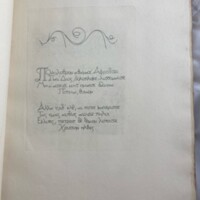
Sappho (Emil Rudolf Weiss and Renée Sintenis, illus.) Sapphō : [viginti duo Sapphus carmina/
Monaci: Piper, 1921.
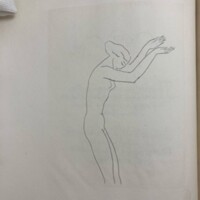
Sappho (Emil Rudolf Weiss and Renée Sintenis, illus.) Sapphō : [viginti duo Sapphus carmina/
Monaci: Piper, 1921.
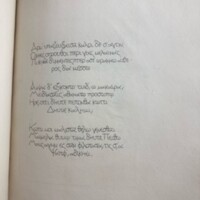
Sappho (Emil Rudolf Weiss and Renée Sintenis, illus.) Sapphō : [viginti duo Sapphus carmina/
Monaci: Piper, 1921.
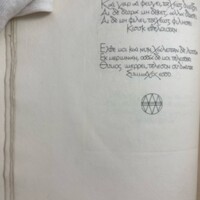
Sappho (Emil Rudolf Weiss and Renée Sintenis, illus.) Sapphō : [viginti duo Sapphus carmina/
Monaci: Piper, 1921.
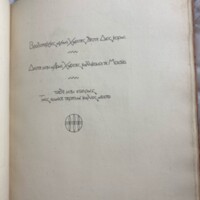
Sappho (Emil Rudolf Weiss and Renée Sintenis, illus.) Sapphō : [viginti duo Sapphus carmina/
Monaci: Piper, 1921.
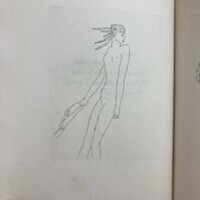
Sappho (Emil Rudolf Weiss and Renée Sintenis, illus.) Sapphō : [viginti duo Sapphus carmina/
Monaci: Piper, 1921.
The second item related to Sappho included in the exhibit is a beautiful artist’s book called Fragments, which contains thirteen poems. We’ve chosen this artist’s book because of its evocative art by the Swiss artist Marcel Mathys. The book is unbound, made up entirely of sheets of folded paper collected inside stiff paper covers, which mirrors the fragmentary nature of Sappho’s surviving corpus. Unlike Weiß and Sintenis’s edition, this one integrates the text amid the illustrations.
The Ode to Aphrodite
translated by J.V. Cunningham
Bright-throned, undying Aphrodite,
God’s child, manipulator, hear me!
Destroy not with anguish and heartbreak
Lady, my spirit,
But come to me here if other times
You ever my voice in the distance
Have heard, and, leaving your father’s house
Have come, your golden
Chariots yoked, your beautiful swift
Sparrows, dense-winged, spiraling above
The black earth, from th’ heavenly aether
Through the middle air
And now here. You, of the Lucky Ones,
With a smile on your undying face,
Asked what now is the matter with me?
Why now do I call?
What do I most wish for for myself
In my mad heart? “Who is it I must
Now win over for you? Who, Sappho,
Is unfair to you?
She who avoids will soon be seeking;
Who gives back gifts will be giving here;
Who does not love will soon be in love,
If unwillingly.”
Come once more! This hard-to-be-dealt-with
Anxiety loosen, and what my
Spirit would have let it have, yourself
My fellow-soldier.
